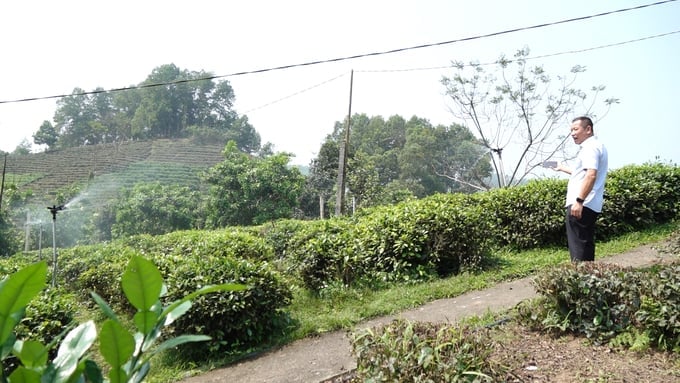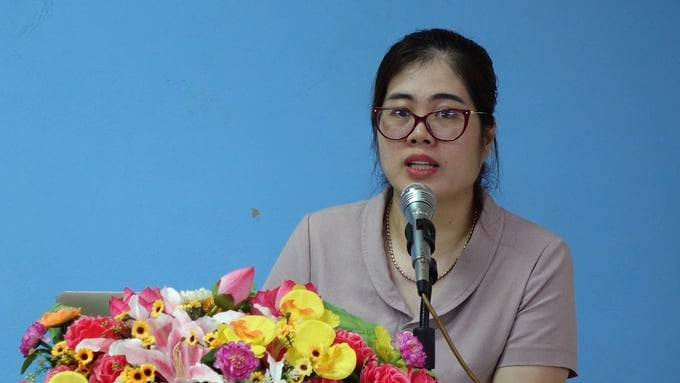May 29, 2025 | 16:00 GMT +7
May 29, 2025 | 16:00 GMT +7
Hotline: 0913.378.918
May 29, 2025 | 16:00 GMT +7
Hotline: 0913.378.918
The "National Digital Transformation Program until 2025, with a vision towards 2030" identifies agriculture as one of eight prioritized sectors in Vietnam. To date, the digital transformation process in agriculture has reached several significant milestones, albeit with numerous challenges remaining.
The current annual agricultural growth in Vietnam is approximately 3.5%, which is higher than the average in Asia and Southeast Asia. However, according to estimations by the Ministry of Information and Communications, the rate of digital transformation in agriculture has reached only 2.1%, a low level compared to the global standard.

Khe Coc Safe Tea Cooperative, located in Tuc Tranh commune, Phu Luong district, Thai Nguyen province, is implementing digital technology in crop production, automatic irrigation, and real-time data updates to mobile phones. Photo: Quang Linh.
Do Anh Dung, Head of the Information and Training Department at the Thai Nguyen province's Agricultural Extension Center, noted that despite its advantages, Vietnam's agricultural sector frequently suffers from severe impacts resulting from natural disasters and climate change. As a result, the application of Data Analytics technology for analyzing and managing climate zones will alert farmers to risks and enable timely responses.
On the other hand, Blockchain technology and Geographic Information System (GIS) can enable the establishment of traceability systems. These technologies allow farmers to provide information regarding the origin and production process of agricultural products. Subsequently, consumers can scan QR codes or search the system for detailed product information, thereby promoting transparency in product quality and origin.
“Digital transformation provides communication channels and feedback mechanisms between farmers and consumers. Online platforms allow consumers to provide feedback, ask questions, and receive responses from farmers, fostering a direct relationship without intermediaries,” added Do Anh Dung.
With the aim of enhancing digital technology application and integration into production and promotion, Thai Nguyen province's Agricultural Extension Center recently held a training course on "Digital Transformation in Agricultural Production" for 40 representatives, including extension officers, technical staff, cooperative members, and farmers within the province. “With this training program, we learned about the importance of digital technology in product promotion and introduction,” commented Tong Thi Kim Thoa, a participant of the training course, and Director of Kim Thoa Tea Cooperative located in Thai Nguyen city.
According to Dr. Dao Thi Huong from Thai Nguyen University of Economics and Business Administration, digital transformation in agriculture is an inevitable development trend due to the increasing prevalence of technology.
Digital transformation not only addresses product quality issues, but also connects markets and builds agricultural brands, thereby establishing a modern agriculture sector that offers high value and income.

Dr. Dao Thi Huong, a lecturer at Thai Nguyen University of Economics and Business Administration, emphasized that digital transformation in marketing and product promotion can significantly reduce costs for farmers. Photo: Quang Linh.
Dr. Huong believes that farmers need to enhance collaboration with digital economic agencies to engage in e-commerce through various digital platforms, such as TikTok Shop, Voso, and Sendo. Consequently, the collaboration will facilitate a substantive and effective digital transformation in agriculture.
“Digital transformation will provide farmers with useful tools for communication and marketing, thereby enhancing product branding. However, farmers should not rely solely on artificial intelligence to create marketing materials. Each farmer should infuse their products with unique and genuine stories that only agricultural producers can offer. Consumers will purchase products not only for their useful features and nutritional value, but also for the stories behind each product,” Dr. Huong noted.
Dr. Huong also encourages farmers to focus on developing production chains in association with digital technology. In addition to the adoption of modern technology, digital transformation in agriculture aims to create natural linkages among the components of the agricultural ecosystem, and establish a value chain; promote the consumption of agricultural products through social media channels; and contribute to the development of agricultural production.
Thai Nguyen province has systematically implemented digital transformation tasks with a focus on modernity since early 2024, resulting in tangible benefits for the local community and businesses, and contributing to the socio-economic development of the region. In accordance with the Party and State’s policies on digital transformation, Thai Nguyen has effectively deployed digital transformation across three pillars: digital government, digital economy, and digital society.
With regards to the digital economy, Thai Nguyen province has actively promoted the development of businesses specializing in digital technology, digital content, and e-commerce. Notably, the province's total revenue from digital economy reached nearly 400,000 billion VND in the first six months of 2024. Furthermore, there are more than 500,000 customers and 9,300 points of sale operating through the Mobie Money service across the province. The cumulative number of payment transactions via Internet/ATM/POS channels reached over 6.6 million, with a total transaction value of over 66,000 billion VND.
Translated by Nguyen Hai Long
/2025/05/25/4127-3-073637_820.jpg)
(VAN) Thanks to the promotion from an FAO-implemented project, vegetable production in greenhouses in Moc Chau has seen strong development, from 1.5 hectares in 2021 to nearly 50 hectares in 2024.

(VAN) FAO has recently supported USD 140,000 to implement the project 'Risk mitigation human-animal interface risks through disease control initiatives in pig farming.'

(VAN) The People's Committee of Tra Vinh province has approved an adjustment to the investment policy for the Green Hydrogen Plant project, increasing its area to approximately 52.76 hectares.
![Reducing emissions from rice fields: [2] Farmers’ commitment to the soil](https://t.ex-cdn.com/nongnghiepmoitruong.vn/608w/files/news/2025/05/05/dsc08881jpg-nongnghiep-140632.jpg)
(VAN) Clean rice cultivation model in Thuong Tan commune, Bac Tan Uyen district, is assisting local residents in achieving sustainable agriculture by substantially reducing costs, increasing productivity, and protecting the environment.

(VAN) At the conference to disseminate Resolution No. 68, AgriS introduced its digital agricultural ecosystem and reaffirmed its commitment to accompanying the Government in promoting private sector development and sustainable agriculture.

(VAN) 'Blue Ocean - Blue Foods' initiative is designed to restore marine ecosystems and establish sustainable livelihoods for local communities by cultivating a minimum of 1,000 hectares of cottonii seaweed in the first three years.
/2025/05/21/4642-3-112707_603.jpg)
(VAN) The V-SCOPE project has made direct contributions to three out of six pillars of the Comprehensive Strategic Partnership between Vietnam and Australia.